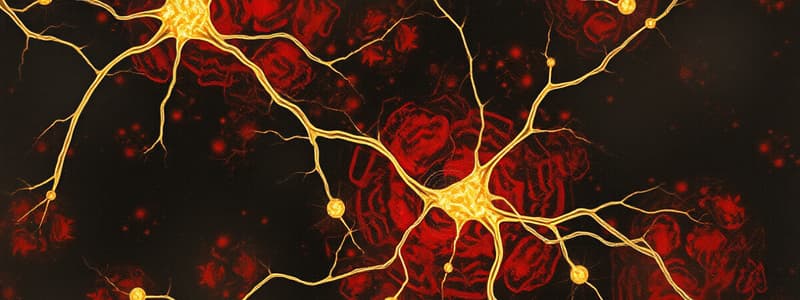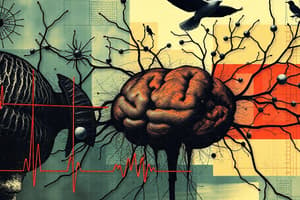Podcast
Questions and Answers
What is the effect of an Excitatory Post Synaptic Potential (EPSP)?
What is the effect of an Excitatory Post Synaptic Potential (EPSP)?
- It leads to hyperpolarization.
- It decreases the likelihood of an action potential.
- It causes a small depolarization. (correct)
- It always produces an action potential.
What happens at the axon hillock when sufficient EPSPs are reached?
What happens at the axon hillock when sufficient EPSPs are reached?
- EPSPs are converted into IPSPs.
- IPSPs increase the threshold.
- Na+ channels open and lead to an action potential. (correct)
- The cell becomes hyperpolarized permanently.
What is the primary outcome when multiple EPSPs and IPSPs are present?
What is the primary outcome when multiple EPSPs and IPSPs are present?
- Both will always lead to an action potential.
- They can cancel each other out. (correct)
- The EPSPs always dominate leading to action potentials.
- IPSPs always inhibit action potentials.
How do Inhibitory Post Synaptic Potentials (IPSPs) affect the generation of action potentials?
How do Inhibitory Post Synaptic Potentials (IPSPs) affect the generation of action potentials?
What initiates the generation of an action potential at the axon hillock?
What initiates the generation of an action potential at the axon hillock?
What type of communication occurs through gap junctions in the brain?
What type of communication occurs through gap junctions in the brain?
What is the typical distance between cells in a gap junction?
What is the typical distance between cells in a gap junction?
Which of the following is a function of gap junctions in neural communication?
Which of the following is a function of gap junctions in neural communication?
Which scenario exemplifies the use of gap junctions for fast communication?
Which scenario exemplifies the use of gap junctions for fast communication?
What role do connexons play in gap junctions?
What role do connexons play in gap junctions?
What initiates the process of neurotransmitter release in chemical synapses?
What initiates the process of neurotransmitter release in chemical synapses?
Which of the following accurately describes the role of vesicles in chemical synapses?
Which of the following accurately describes the role of vesicles in chemical synapses?
What occurs after the vesicle content is emptied into the synaptic cleft?
What occurs after the vesicle content is emptied into the synaptic cleft?
Which step occurs first when an action potential reaches the presynaptic bouton?
Which step occurs first when an action potential reaches the presynaptic bouton?
What is the primary function of neurotransmitters in chemical synapses?
What is the primary function of neurotransmitters in chemical synapses?
What role do neurotransmitters play in neuron communication?
What role do neurotransmitters play in neuron communication?
Which of the following accurately describes exocytosis at the terminal bouton?
Which of the following accurately describes exocytosis at the terminal bouton?
What initiates exocytosis in the terminal boutons during neurotransmitter release?
What initiates exocytosis in the terminal boutons during neurotransmitter release?
In axosomatic synapses, where do the axons form connections?
In axosomatic synapses, where do the axons form connections?
What is the purpose of endocytosis in neuron communication?
What is the purpose of endocytosis in neuron communication?
What is the function of SNARE proteins during neurotransmitter release?
What is the function of SNARE proteins during neurotransmitter release?
Which arrangement describes a synapse between two axons?
Which arrangement describes a synapse between two axons?
Where does neurotransmitter metabolism occur?
Where does neurotransmitter metabolism occur?
Which of the following best describes the synaptic cleft?
Which of the following best describes the synaptic cleft?
What is the primary role of agonists in relation to receptors?
What is the primary role of agonists in relation to receptors?
How do antagonists affect neurotransmitter action?
How do antagonists affect neurotransmitter action?
What might be a consequence of removing components involved in synaptic transmission?
What might be a consequence of removing components involved in synaptic transmission?
Which of the following accurately describes a characteristic of synaptic receptors?
Which of the following accurately describes a characteristic of synaptic receptors?
What effect does an agonist typically have on a postsynaptic neuron?
What effect does an agonist typically have on a postsynaptic neuron?
What is a potential effect of using an antagonist at a synapse?
What is a potential effect of using an antagonist at a synapse?
Which statement about neurotransmitter activity is true?
Which statement about neurotransmitter activity is true?
Which of these would most likely impair synaptic transmission?
Which of these would most likely impair synaptic transmission?
Flashcards are hidden until you start studying
Study Notes
Synaptic Transmission Overview
- Action potentials result from the summed potential change and depolarization of a neuron.
- Postsynaptic potentials involve two types: Excitatory Post Synaptic Potential (EPSP) and Inhibitory Post Synaptic Potential (IPSP).
Excitatory Post Synaptic Potential (EPSP)
- EPSPs occur when positive ions enter the neuron, causing a slight depolarization.
- Individual EPSPs are insufficient to trigger an action potential on their own.
Inhibitory Post Synaptic Potential (IPSP)
- IPSPs arise when negative ions enter the neuron, leading to hyperpolarization.
- IPSPs inhibit action potentials by pushing the potential downward and counteracting EPSPs.
Integration of Postsynaptic Inputs
- Neurons receive multiple inputs that can balance or cancel each other out, particularly EPSPs and IPSPs.
- A sufficient number of EPSPs can lead to an action potential if the threshold at the axon hillock is reached.
Action Potential Generation
- When depolarization at the axon hillock reaches a critical threshold, Na+ channels open, leading to a rapid influx of sodium ions.
- This influx creates the action potential, while significant IPSP activity can prevent action potential firing.
Types of Synapses
- Electrical synapses (gap junctions) allow direct ion transfer between neurons for faster communication.
- Chemical synapses involve neurotransmitter release across a synaptic cleft for communication.
Electrical Synapses
- A gap of approximately 3.5 nm allows for rapid signaling and synchronous neuron activity.
- Examples include coordination between brain hemispheres during breathing and reflex responses.
Chemical Synapses
- Formed between axon terminals and dendritic spines, relying on neurotransmitters to convey signals.
- Action potentials at the presynaptic bouton trigger calcium influx, leading to neurotransmitter exocytosis from vesicles.
Synaptic Transmission Process
- Vesicles containing neurotransmitters migrate to the presynaptic membrane following action potential arrival.
- Exocytosis occurs, releasing neurotransmitters into the synaptic cleft, where they bind to postsynaptic receptors.
Synaptic Receptors and Neurotransmitter Dynamics
- Neurotransmitter binding can activate post-synaptic receptors, leading to either excitatory or inhibitory effects.
- Some neurotransmitters are recycled through reuptake mechanisms, while others are metabolized.
Summary of Synaptic Arrangements
- Common arrangements include axodendritic (axon to dendrite), axosomatic (axon to soma), and axoaxonic (axon to axon) connections.
Revision Tips
- Visual aids of pre-synaptic and post-synaptic components, and action potential mechanics are beneficial for mastering the content.
- Modulating components could illustrate impacts on neuronal communication.
Next Topics
- Upcoming lectures will cover neuroanatomy, with specific readings suggested for deeper understanding.
Studying That Suits You
Use AI to generate personalized quizzes and flashcards to suit your learning preferences.



